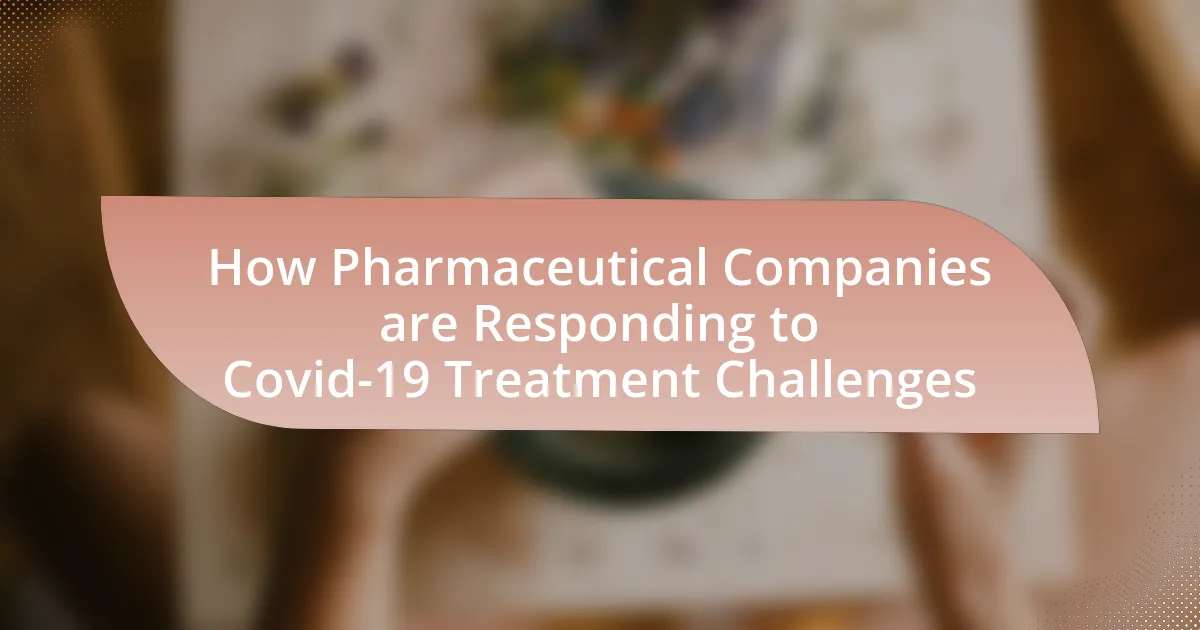Pharmaceutical companies are actively addressing the challenges posed by Covid-19 through the rapid development and distribution of vaccines and therapeutics. Key strategies include accelerated vaccine creation, extensive clinical trials for antiviral treatments, and collaborations with governments and research institutions. Companies are prioritizing research and development by reallocating resources and increasing funding, while also facing challenges such as regulatory hurdles and supply chain disruptions. Innovations like mRNA technology and monoclonal antibodies are emerging as significant advancements in treatment options. The article explores these efforts, the role of collaboration, and the lessons learned for future pandemic preparedness.

How are Pharmaceutical Companies Addressing Covid-19 Treatment Challenges?
Pharmaceutical companies are addressing Covid-19 treatment challenges by rapidly developing and distributing vaccines and therapeutics. For instance, companies like Pfizer and Moderna created mRNA vaccines that demonstrated over 90% efficacy in preventing severe illness, significantly reducing hospitalizations and deaths. Additionally, pharmaceutical firms are conducting extensive clinical trials for antiviral treatments, such as Paxlovid by Pfizer, which has shown to reduce the risk of hospitalization by 89% in high-risk patients. These efforts are supported by global collaborations and funding initiatives, such as Operation Warp Speed, which accelerated vaccine development timelines and facilitated widespread distribution.
What strategies are being implemented by pharmaceutical companies?
Pharmaceutical companies are implementing strategies such as accelerated vaccine development, collaboration with governments and research institutions, and investment in digital health technologies. Accelerated vaccine development has been exemplified by the rapid creation of COVID-19 vaccines, with companies like Pfizer and Moderna producing effective vaccines in under a year, a process that typically takes several years. Collaborations, such as the partnership between AstraZeneca and the University of Oxford, have facilitated shared resources and expertise, expediting research and distribution. Additionally, investments in digital health technologies, including telemedicine and data analytics, have enhanced patient engagement and monitoring, allowing for more efficient treatment delivery during the pandemic. These strategies collectively demonstrate the pharmaceutical industry’s adaptive response to the challenges posed by COVID-19.
How are companies prioritizing research and development for Covid-19 treatments?
Companies are prioritizing research and development for Covid-19 treatments by reallocating resources, increasing funding, and collaborating with public and private sectors. For instance, pharmaceutical companies like Pfizer and Moderna rapidly shifted their focus to mRNA technology, leading to the development of effective vaccines within a year. Additionally, the U.S. government’s Operation Warp Speed provided substantial financial support, facilitating accelerated clinical trials and regulatory processes. This strategic prioritization has resulted in over 300 Covid-19 treatments and vaccines being developed globally, showcasing the industry’s commitment to addressing the pandemic efficiently.
What role does collaboration play in addressing treatment challenges?
Collaboration plays a crucial role in addressing treatment challenges by enabling pharmaceutical companies to share resources, knowledge, and expertise. This cooperative approach accelerates the development of effective treatments and vaccines, as evidenced by the rapid creation of COVID-19 vaccines through partnerships like the collaboration between Pfizer and BioNTech, which combined their research capabilities and technologies. Such alliances not only enhance innovation but also streamline regulatory processes, allowing for quicker responses to emerging health crises.
What are the key challenges faced by pharmaceutical companies?
Pharmaceutical companies face several key challenges, including regulatory hurdles, high research and development costs, and market access issues. Regulatory hurdles arise from stringent approval processes that can delay product launches, as seen with the lengthy FDA review times for new drugs. High research and development costs are significant, with estimates indicating that developing a new drug can exceed $2.6 billion, according to a study by the Tufts Center for the Study of Drug Development. Market access issues involve navigating complex pricing and reimbursement landscapes, which can limit the availability of new treatments to patients. These challenges are compounded by the need for rapid innovation in response to public health crises, such as the COVID-19 pandemic, which has further strained resources and accelerated the demand for effective therapies.
How has the pandemic affected supply chains for pharmaceutical companies?
The pandemic has significantly disrupted supply chains for pharmaceutical companies by causing delays in raw material sourcing and manufacturing processes. Lockdowns and restrictions led to factory closures and reduced workforce availability, which hindered production capabilities. Additionally, transportation restrictions resulted in logistical challenges, making it difficult to distribute products globally. According to a survey by the International Federation of Pharmaceutical Manufacturers & Associations, 75% of companies reported supply chain disruptions due to COVID-19, highlighting the widespread impact on the industry.
What regulatory hurdles are companies encountering in developing treatments?
Companies are encountering several regulatory hurdles in developing treatments, including lengthy approval processes, stringent clinical trial requirements, and evolving guidelines from regulatory bodies. The U.S. Food and Drug Administration (FDA) and the European Medicines Agency (EMA) impose rigorous standards for safety and efficacy, which can delay the introduction of new therapies. For instance, the FDA’s requirement for extensive Phase III trials can take years, impacting the speed at which companies can respond to urgent health crises like COVID-19. Additionally, the need for real-world evidence and post-marketing surveillance adds complexity to the regulatory landscape, as companies must navigate these requirements while ensuring compliance with changing regulations.
What innovations are emerging in Covid-19 treatment development?
Innovations in Covid-19 treatment development include monoclonal antibodies, antiviral therapies, and novel vaccine platforms. Monoclonal antibodies, such as those developed by Regeneron and Eli Lilly, have shown efficacy in reducing hospitalization rates and viral load in patients. Antiviral therapies, like Paxlovid from Pfizer, have been authorized for emergency use and demonstrated significant reductions in the risk of severe disease. Additionally, mRNA vaccine technology, utilized by Pfizer-BioNTech and Moderna, has revolutionized vaccine development, allowing for rapid adaptation to emerging variants. These advancements are supported by clinical trial data, which indicate improved outcomes and efficacy in treating Covid-19.
How are new technologies influencing treatment options?
New technologies are significantly influencing treatment options by enabling faster drug development, personalized medicine, and improved patient monitoring. For instance, the use of artificial intelligence in drug discovery has accelerated the identification of potential therapies, reducing the time from concept to clinical trials. A notable example is the rapid development of mRNA vaccines for COVID-19, which utilized novel technology to provide effective immunity in record time. Additionally, advancements in telemedicine and wearable devices allow for real-time health monitoring, facilitating timely interventions and tailored treatment plans. These innovations demonstrate a shift towards more efficient, targeted, and patient-centered approaches in healthcare.
What role do clinical trials play in the development of Covid-19 treatments?
Clinical trials are essential in the development of Covid-19 treatments as they rigorously evaluate the safety and efficacy of new therapies. These trials follow a structured process, typically divided into phases, where each phase assesses different aspects of the treatment, such as dosage, side effects, and overall effectiveness. For instance, the rapid development of vaccines like Pfizer-BioNTech and Moderna involved extensive clinical trials that demonstrated their efficacy rates of approximately 95% and 94%, respectively, in preventing Covid-19. This evidence from clinical trials is crucial for regulatory approval and ensures that treatments are both safe for public use and effective in combating the virus.
How are pharmaceutical companies communicating with the public about Covid-19 treatments?
Pharmaceutical companies are communicating with the public about Covid-19 treatments primarily through digital platforms, press releases, and public health collaborations. These companies utilize social media, official websites, and online webinars to disseminate information regarding treatment efficacy, safety data, and ongoing clinical trials. For instance, Pfizer and Moderna have actively engaged in sharing updates on their vaccine developments and treatment options through their websites and social media channels, ensuring transparency and accessibility of information. Additionally, partnerships with health organizations, such as the World Health Organization, enhance the credibility of their communications by aligning with trusted public health messaging.
What messaging strategies are being used to inform patients and healthcare providers?
Pharmaceutical companies are employing targeted messaging strategies that include digital communication, educational webinars, and social media outreach to inform patients and healthcare providers about COVID-19 treatments. These strategies aim to disseminate accurate information quickly and effectively, addressing the urgent need for reliable data during the pandemic. For instance, companies like Pfizer and Moderna have utilized online platforms to share clinical trial results and safety information, ensuring that both patients and healthcare professionals have access to the latest updates. Additionally, educational webinars hosted by these companies provide in-depth discussions on treatment protocols and emerging therapies, reinforcing their commitment to transparency and education in the healthcare community.
How are companies addressing vaccine hesitancy among the public?
Companies are addressing vaccine hesitancy among the public by implementing targeted educational campaigns and engaging with communities to build trust. For instance, pharmaceutical companies are collaborating with healthcare professionals to provide accurate information about vaccine safety and efficacy, which has been shown to increase public confidence. A study published in the journal “Vaccine” found that community-based interventions, such as informational sessions and outreach programs, significantly improved vaccination rates in hesitant populations. Additionally, companies are utilizing social media platforms to counter misinformation and share testimonials from vaccinated individuals, further reinforcing positive perceptions of vaccines.
What lessons have been learned from the Covid-19 pandemic for future treatment development?
The Covid-19 pandemic has taught pharmaceutical companies the importance of rapid response and collaboration in treatment development. The accelerated development of mRNA vaccines, such as those by Pfizer-BioNTech and Moderna, demonstrated that innovative technologies can significantly shorten the timeline for vaccine creation, with Pfizer’s vaccine receiving emergency use authorization in under a year. Additionally, the pandemic highlighted the necessity for global collaboration, as seen in initiatives like COVAX, which aimed to ensure equitable access to vaccines worldwide. These experiences underscore the need for flexible regulatory frameworks and increased investment in research and development to enhance preparedness for future pandemics.
How can pharmaceutical companies improve their response to future pandemics?
Pharmaceutical companies can improve their response to future pandemics by enhancing collaboration with global health organizations and investing in rapid vaccine development technologies. Collaborative efforts, such as those seen during the COVID-19 pandemic with initiatives like COVAX, enable faster sharing of data and resources, which is crucial for timely responses. Additionally, investing in mRNA technology, which was pivotal in the rapid development of COVID-19 vaccines, can significantly reduce the time required to produce effective vaccines for emerging pathogens. Historical data shows that the speed of vaccine development during the COVID-19 pandemic was unprecedented, with the first vaccines being authorized for emergency use within a year of the virus’s identification, highlighting the potential of advanced technologies in pandemic preparedness.
What best practices have emerged from the Covid-19 treatment efforts?
Best practices that have emerged from Covid-19 treatment efforts include the rapid development and deployment of vaccines, the use of monoclonal antibodies for treatment, and the implementation of telemedicine for patient management. The accelerated vaccine development was exemplified by the Pfizer-BioNTech and Moderna vaccines, which received Emergency Use Authorization within a year of the virus’s identification, showcasing the effectiveness of mRNA technology. Monoclonal antibodies, such as those developed by Regeneron, have been shown to reduce hospitalization rates and severity of illness in high-risk patients. Additionally, telemedicine has become a crucial tool, allowing healthcare providers to monitor and treat patients remotely, thereby minimizing virus transmission and ensuring continuity of care. These practices have been validated through clinical trials and real-world data, demonstrating their impact on improving patient outcomes during the pandemic.
What practical steps can pharmaceutical companies take to enhance their Covid-19 treatment strategies?
Pharmaceutical companies can enhance their Covid-19 treatment strategies by investing in research and development for new antiviral drugs and therapies. This approach is supported by the urgent need for effective treatments, as evidenced by the rapid development of Remdesivir and monoclonal antibodies, which have shown efficacy in reducing hospitalization rates. Additionally, companies should prioritize collaboration with public health organizations and regulatory bodies to streamline clinical trials, ensuring faster access to promising treatments. The World Health Organization reported that adaptive trial designs can significantly reduce the time required to evaluate new therapies, thus facilitating quicker responses to emerging variants. Furthermore, enhancing supply chain logistics to ensure timely distribution of treatments can improve patient access, as demonstrated during the rollout of Covid-19 vaccines. By focusing on these practical steps, pharmaceutical companies can effectively respond to the ongoing challenges posed by Covid-19.


